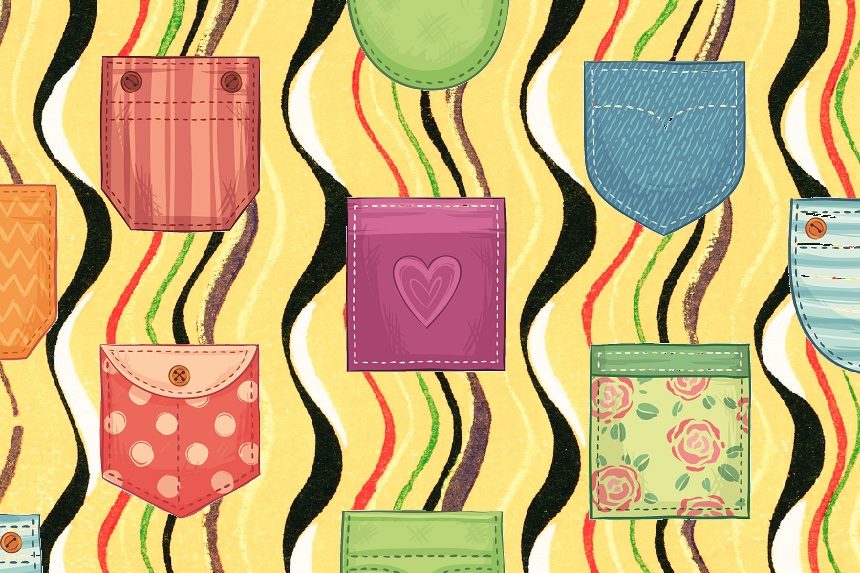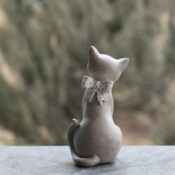Doris and Mickey drove to the recreational complex in separate cars. They arranged to meet at the playground and cut through to the picnic area where the day-of-fun benefit for Cameron Ferderbar was taking place. Cameron, Doris’s neighbor, had fallen off a ladder when cleaning out his roof gutters, and now he was laid up in a rehab facility, which, let’s face it, was actually a nursing home that smelled like diapers. Bankruptcy was pawing at the family’s door, and the GoFundMe had come up short, so Cameron’s men’s club was putting on the benefit hoping to cover some of the healthcare bills.
Doris arrived at the playground wearing a CAPS Sugar sun visor, a red-and-white striped shirt, and white slacks. CAPS processed sugar, and Doris worked in inventory control. As she waited for Mickey, Doris noticed children crowding around a woman dressed in an enormous multicolored patchwork skirt covered in rows of pockets. Next to her was a sign on a chair that read, “The Lady with a Hundred Pockets. Fifty cents per chance.”
The woman smelled like a tropical fruit salad. She reminded Doris of a fertility goddess. She wore her hair in a massive braid, thick as a bicycle tire, that she fixed in a circle on top of her head like an Italian Easter bread, except there was no pink or blue dyed egg in it.
Children were begging their adults for change and darting over to the pocket lady. After she zipped their coins into her belt bag, she let them plunge their hands into her pockets. They came up with mini pinwheels, plastic knights, frogs, lions, junk jewelry, and tiny squirt guns. A few kids liked their loot, at least for a moment, but some did not. They wanted to put the junk back and try again. But the pocket lady tilted her head, shook her finger, and said, “For another chance, you must pay again.” Most of the adults shelled out for two chances, but when the kids wanted more money, their adults escorted them to the play equipment, and, if they kept making a fuss, back to the car.
Mickey showed up twenty minutes late, but at least he showed up. It was a hot August afternoon, and he was mopping his brow. Doris offered him an air hug. Like Doris, Mickey was in his early sixties. They had met two months ago on a dating site for mature people. Age was just a number, that’s what everyone said. Like it was only about age.
Doris had been through one divorce, Mickey three. A solidly built man, he wore his thinning iron-gray hair in comb-over. Not a ridiculous comb-over, one of those trimmer comb-overs. He was a delivery driver for UPS.
“Who’s the gypsy?” he asked.
“That’s the Lady with a Hundred Pockets. For fifty cents, you get to pick one of her pockets. I’m going to try my luck.”
She meant this to sound playful, but Mickey mumbled something about her acting ridiculous and like a little kid and there being better ways to spend money. He stood with his hands in the side pockets of his plaid knee-length shorts while Doris gave the woman two quarters. The lady told her to go for it. Doris stuck her hand into a paisley pocket and pulled out a gold plastic ring with a big faceted plastic ruby in it.
She showed it to Mickey. “My lucky ring. Maybe it will grant me three wishes.”
Mickey gave her a whatever look. “Now I know something new about you. You believe in wishes and luck.” He mopped his brow again.
“I do happen to believe in wishes and luck,” she said, and Mickey gave her another whatever look. It would have been nice if he played along in the spirit of fun, but he evidently did not budge on his principles. She began to think of her wishes, but she kept them to herself. She wished for a caring guy with a sense of humor, speedy healing for Cameron, and a winning state lottery ticket for the Ferderbars. Maybe a winning lottery ticket for herself. What did she spend, maybe ten or twenty dollars a week on the state lottery?
“Why don’t you put that silly thing back and let a kid get it?”
This made Doris feel ashamed. She put the ring back in its paisley pocket. Maybe some little girl would pull it out and be delighted.
“You don’t have to put it back,” said the lady. Doris shrugged like it wasn’t a big deal. Then she saw the lady aim an evil eye at Mickey. It was like a laser locking onto a target. Maybe she had real gypsy powers. Doris hoped that things would improve during the day of fun.
She had paid for the beef and beer tickets, which was only right since this was her cause and the decision to go had been her idea. She wondered what it would be like, Mickey meeting so many of her friends all at once. Maybe he was skittish about that. So far, their dates had been one on one, your basic dinner-and-a-movie thing, and they always went halfsies. It would be nice if he treated her now and then.
The men’s club had produced a shindig. A sound system played country music. There was a dunk tank, horseshoes, drawings for gift baskets, bingo for prizes, and a bean bag game called cornhole. It cost extra for the games. There was a prayer station, too. No charge for that, of course. Connie Ferderbar sat in a lawn chair with a giant get-well card that everyone signed. The aroma of barbeque wafted through the air.
Doris and Mickey headed to the food table, Doris waving to acquaintances along the way. There must have been two hundred people there—neighbors, friends, people from the community.
“Didn’t Cameron have health insurance?” asked Mickey.
“Connie said he dropped their coverage as soon as the government lifted the no-insurance tax penalty. Not too swift, I know.”
“Talk about false economy. And they didn’t find him for three hours? He lay there for three hours? Working alone on a ladder, no spotter?”
“He took risks. But you can fall off a ladder even if you have a spotter,” remarked Doris.
“The guy’s an idiot,” said Mickey. “You take precautions. You carry coverage.” A yellow jacket flew up to Mickey, and he swatted it away.
“There’s good luck and bad luck.” Doris thought of all the times Cameron and Connie had been there for her both during her divorce and after. Cameron had helped her with a leaky faucet, a busted screen door. He’d helped her change lightbulbs she couldn’t reach. “Well, he’s my friend, and that’s the reason we’re here. Do you really have to call him an idiot?”
Mickey loaded his plate with a heap of barbequed beef, big mounds of macaroni salad and cole slaw, and stuck tortilla chips into the salads. He took a can of Pabst and headed to the picnic tables, which were under a pavilion. Worried that Mickey had taken more than his share, Doris took less than she wanted, then sat down next to Mickey.
The Chens, the Rothmans, and the DiPietros joined them. After the introductions, Frances Chen updated everyone on Cameron’s situation. He’d broken a leg and three ribs, screwed up a shoulder, suffered a concussion, and, worst of all, had a spinal cord injury. The spinal cord injury made it hard to predict if he would walk again. Plus, an infection had cropped up in the diaper-smelling rehab. Don’t even ask about the bills. Before the accident, Cameron had managed a restaurant.
“How do you guys know each other?” asked Rose Rothman inclining with interest toward Doris and Mickey.
Marrieds always asked. Singles also asked each other how they met. But that was different, everyone on the same playing field.
“Online dating,” replied Doris, not in a terse voice but in the kind of voice that said she wanted to move on from that topic.
Bea DiPietro said she’d heard quite a few stories about online dating, women meeting creeps and such. Sometimes nice guys too, countered Doris. Bea wanted to know what site she used, and Doris replied in a general way that it was one of the over-fifty sites. In truth, she couldn’t recall if it she’d met Mickey on SilverSingles, or OurTime, or one of the others. No law against having two or three accounts at once. It increased your possibility of finding Mr. Right or, at least, Mr. Available. Sometimes Doris saw the same guys overlapping on the sites. Maybe they noticed her overlapping, too.
“That’s how it’s done now,” said Mickey, rescuing Doris. He took a swig of beer. “You meet people online.”
“Mickey’s a pitcher in a softball league,” Doris piped up, and the husbands, clearly impressed, picked up on the sports theme.
After lunch, Doris and Mickey ambled over to the activities area. Doris bought some chances on gift certificates for local hair salons and restaurants. Mickey said she was wasting her money, why not just patronize the places directly? Doris stared at him.
“You do it to help them raise money,” she explained like he was some kind of dolt who didn’t get it. “The guy had an accident, and now everybody’s helping out.”
“Well, the guy didn’t play his cards right. So now everyone has to bail him out?”
“You think you always deal your own cards, Mickey?” Doris was surprised at her sharp tone. “What about a flood or a hurricane? What about cancer?”
“You buy insurance for those things. You don’t buy a house in a flood plain. You manage your risks.”
Now he was acting ridiculous. And hard-hearted.
“You can’t always control what happens to you. What if you go to a festival and a shooter opens fire?”
“Do you know something I don’t?” he said, trying to be funny.
They walked past the horseshoes and the dunk tank to the bean bag toss with the weird name. Mickey wanted to show his pitching chops. The game was popular, and they took their place in line. Doris wondered if he would pay, since cornhole was his idea, or if, at least, they’d go halfsies. The fellow in charge explained the rules of the game, which were fairly involved with all sorts of scoring levels. You aimed to toss the bean bag into the hole, and the holes were on two slanted boards. One board had a sun, the other a moon.
“Hey, Sugar,” said a voice behind Doris. There stood Louella from work, also sporting a CAPS sun visor. She was with a fellow named John, whom Doris had dated in the past. They had met on OurTime. Or was it SilverSingles? Louella and John were holding hands.
The women made the introductions.
“How do you do?” said Doris, trying to act as if she were meeting John for the first time.
“Pleased to meet you, Doris,” returned John. They discovered that they were each there to support Cameron, who was a mutual friend. “A good time for a good cause, but a good cause for a sad reason.”
They decided to play teams. First girls against boys, then couples. John took out his wallet. Mickey left his wallet in his pants.
Doris’s bean bags kept landing on the grass. Louella had slightly better aim, but the boys won, Mickey landing all this throws right in the hole. Doris noticed that Louella wore a slender gold ring with a tiny red gemstone, a garnet or ruby, on her right ring finger. “A promise ring,” said Louella with a glint in her eye.
Doris took the singles prerogative and asked how they met.
“Online dating,” said Louella.
“What a coincidence. That’s how we met.” What had she missed in John? She had thought him boring and stodgy and let things trail off after two dates. What a gentleman he was and clearly in love with Louella.
They changed to couples teams. Louella and John tried impromptu rituals each time they prepared to throw their bean bags, touching an ankle for good luck, doing a few Charleston steps, each breathing on the promise ring. They racked up points, but again Mickey landed all four of his bags in the hole. He tried to help Doris improve her aim, advising her to shoot to the left since her tendency was to pitch to the right, but that did not help. She finally turned around and threw backwards. Shockingly, her last bean bag made the hole.
Mickey shook his head in amazement. “Gotta say, dumb luck won that time.”
Doris did a little happy dance.
After the game, Louella and John moseyed off in the direction of the food table, and Doris and Mickey headed to the dunk tank. There was a big crowd there too, and one of the neighbors sat on the platform of the dunk tank cage egging people on, “We want a pitcher, not a glass of water! We want a pitcher, not a belly itcher!” Everyone was missing the target. “You pays your money and you takes your chances,” yelled the guy collecting the money. It cost ten bucks for three tries.
“Sugar, I’d like a shot at that dunk tank. Bet I could sink the guy,” said Mickey.
“I bet you could,” said Doris. “Show ’em what you got.”
Mickey stood there with an expectant look. Then he rubbed his fingers together in a where’s-the-money gesture.
Doris blinked. “Pretty much, Mickey,” said Doris, “it’s your turn to pay for some of the entertainment. To be fair, I mean, looking at the whole afternoon.”
“The laid-up guy is your friend. It’s a conflict of interest for me. I don’t believe in paying the bills for people who got themselves into their messes. Ethically, you should pay.”
“Ethically? Ethically, there’s something called sharing and generosity.” She looked at him for a response. He looked at her. It was a standoff. “Come on, Mickey. Come on,” said Doris. “Don’t be cheap and childish. You’re acting like a little kid asking his mom for money. Like those kids with the pocket lady.”
Mickey blazed a look at Doris. She had called him on his behavior, maybe overdid it, and he more than didn’t like it. He looked ferocious, and it scared her.
He tore a ten-dollar bill from his wallet and thrust it at the carnival barker guy. People noticed his rapid movements. He was making a scene.
Maybe she should have paid the ten bucks and afterward called it quits between them. A one-time appeasement. But something in her made her say what she said and in the tone that she said it.
Everyone stepped back as Mickey wound up for the pitch. Doris knew his skill, but the others did not. They only saw his aggression, the hard set of his mouth, and Doris standing by with a crooked smile. She knew that in the privacy of a home, which they would never ever share, he would always be right, even if he were not right. She knew that type. The type that called disagreement starting a fight.
Mickey launched his meanest fastball and hit the bullseye hard. It was assault by proxy. She could feel it. He smiled a triumphant smile. Normally people would clap and laugh as the guy in the dunk tank dropped into the drink. Instead, silence settled over the crowd. “You really know how to spoil an afternoon,” he snapped loud enough for others to hear. “Don’t bother to call.” With that, Mickey stalked off in the direction of the playground.
Her face reddened with embarrassment, but it would have been worse if Louella and John had witnessed the drama. How lucky that she and Mickey had come in separate cars.
Abandoned, or was it liberated? Doris wandered around the grounds. “Old Town Road” played on the sound system. She looked at her cell phone and watched other people play bingo and lawn games. She joined Connie Ferderbar and chatted with her about the great turnout, the tasty barbeque, and the loving and supportive friends.
Frances Chen, Rose Rothman, and Bea DiPietro joined them. Had they observed the scene at the dunk tank?
“Where’s your friend?” asked Bea.
“He had to go somewhere,” replied Doris, trying to look stoic. The women nodded.
“I don’t know how anyone finds anyone in this world,” said Frances.
“It takes a miracle, but you have to believe in miracles,” said Rose.
Doris did not stick around for the prize drawings. She said her farewells and made her way toward the playground and the parking lot. She’d taken a chance on Mickey, and it wasn’t a winning chance. Or maybe she had chosen Mickey, and it turned out to be a bad choice. Her thoughts turned to poor Cameron, and she felt that her dating issues were just plain silly compared to other people’s problems.
The lady with a hundred pockets was packing up. She recognized Doris and waved to her. She didn’t smell like a tropical fruit salad anymore and her elaborate Easter bread hairdo was falling apart. She no longer wore the theatrical face of the seer.
“Where’s your man friend?”
“He couldn’t stay,” replied Doris. “He had to leave.”
“That dude was a jerk. You can do better. Here, have another try at a pocket. It’s on me.”
Doris found the same paisley pocket in which she’d found the ring. Lo and behold, the golden piece of junk, the trinket that Mickey had shamed her into giving back, was still there. She smiled and slid the clunky thing onto her finger. As Doris drove back home, she felt safe. She had never felt safer. And she thought of her wishes, which were pretty things and well worth wishing for, even though they might never come true.
Featured image by Furuya Korin, Shutterstock
Become a Saturday Evening Post member and enjoy unlimited access. Subscribe now




Comments
Good story, and a cautionary tale about online dating. This guy Mickey is bad news, and would likely abuse her mentally, emotionally and physically.
He showed no empathy or compassion for Cameron or his family, was a judgemental know-it-all, cheapskate and much more per the story. Doris is well rid of him!
I’d like to think the gold ring she got back from the pocket lady and the feeling it gave her driving home was a sign she’d meet the right guy sooner than later.